Treacherous implies readiness to betray trust or confidence. perfidious adds to faithless the implication of an incapacity for fidelity or reliability.
One must admire in one way the gall of Qantas. Presumably with the spiv who walked Gall Way home set the tone. Qantas want the customers to pay for the compensation for the bastardry committed by itself on the same customers. Higher prices, projected introduction of a true cattle class confined to strap hanging on aircraft. Who knows what further pain would Joyce have inflicted on us for years, as he looted the airline.
His successors seem not to have learnt.
 No, you miserable sods, reduce the dividend to those shareholders, who have basked in your bastardry, earning gross financial returns generated by this unmitigated bastardry, engineered by the little Irish-Australian now skulking in some mansion, perhaps in the aptly-named Dublin suburb of Goatstown. Funnily enough, he does not want return to face the music – the Moonflit Concerto being a favourite piece of his.
No, you miserable sods, reduce the dividend to those shareholders, who have basked in your bastardry, earning gross financial returns generated by this unmitigated bastardry, engineered by the little Irish-Australian now skulking in some mansion, perhaps in the aptly-named Dublin suburb of Goatstown. Funnily enough, he does not want return to face the music – the Moonflit Concerto being a favourite piece of his.
I have confined myself to so few uses of “bastardry”! There seems to be no corresponding word for it in Gaelic.
Nothing has changed because the government we voted for has allowed them to develop a complete monopoly. Time to nationalise this disreputable embarrassment which fell twelve places in the rankings from 5 to 17 this year. But then Virgin Airlines fell from 43 to 46. This coming year, watch the free fall continue.
Brat is a Brat is a Brat
There is an acquaintance of ours, a former teacher who decided to volunteer at a local school as a teacher’s aide.She was faced with a brat, a common manifestation of the male growing up. She went to encourage him to behave, by calmly admonishing and telling him, “c’mon, do some work.”

To which this man-child responded “Step back. You are making me feel unsafe”.
This sense of entitlement in one so young!
Oh, for National Service.
But then who am I to talk! A life speckled with entitlement. Nevertheless, from experience, if you keep saying that Ponsonby Minor, I assure you that you will soon learn the meaning of “unsafe”.
Olive Oil
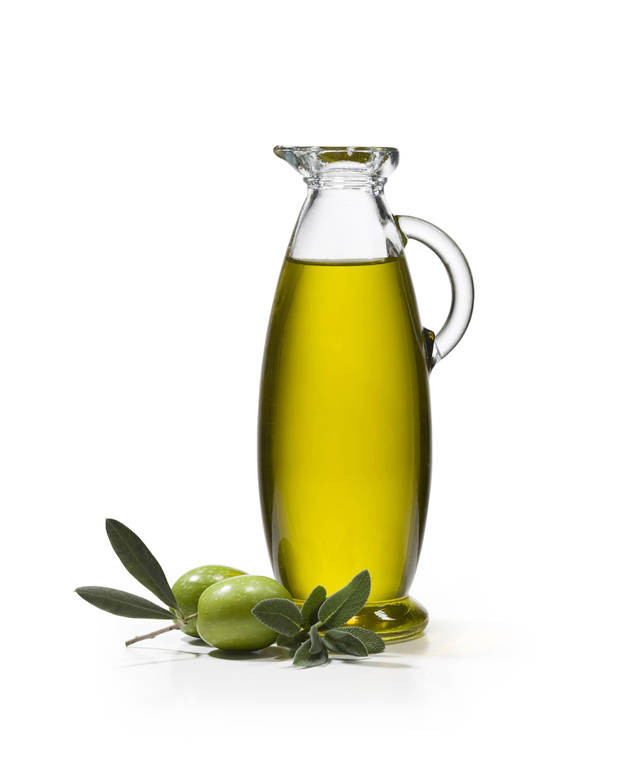 Homer called it liquid gold. To Hippocrates it was “the great healer”. These days olive oil is used to sauté vegetables or dress salads—but it is once again becoming a luxury. In September prices reached their highest level since records began, rising by 117% year-on-year according to the International Monetary Fund. Olive oil is seventeen times as valuable as crude oil weight for weight; in 2019 it was seven times cheaper. Why has the price shot up? – The Economist 13 December 2023.
Homer called it liquid gold. To Hippocrates it was “the great healer”. These days olive oil is used to sauté vegetables or dress salads—but it is once again becoming a luxury. In September prices reached their highest level since records began, rising by 117% year-on-year according to the International Monetary Fund. Olive oil is seventeen times as valuable as crude oil weight for weight; in 2019 it was seven times cheaper. Why has the price shot up? – The Economist 13 December 2023.
The price has shot up because the crops have failed in Europe, or rather, not lived up to expectations. There is the matter of climate change and even though Australia does not rank in the top ten olive producers, our crops do not seem to have the same problems as Europe is experiencing. We should not get too smug, because Australia is the seventh biggest importer of olive oil in the world. The Mediterranean diet certainly has a hold here. Australia has come a long way since my first experience of the rancid oil that Spain used to dump here.
Spain produces about 40 to 50 per cent of the world’s olive oil, and together with other major producers, Italy and Greece have experienced extreme drought and heat, even beyond the tolerance of this tree which grows prolifically, as I thought, in less arable land enjoying the climate, “baking summers and mild winters”.
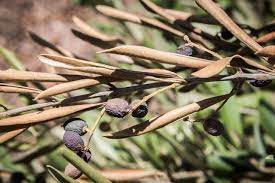
Compounding the crisis, as reported in the Economist, in Italy, Xylella fastidiosa, a bacterium, has ravaged trees. The disease, which is spread by insects, is thought to have been introduced by an ornamental plant from Costa Rica in 2008. It has since killed an estimated 21 million trees. The bacterium is transmitted exclusively by xylem sap-feeding insects such as grass sharpshooters and spittlebugs. These are unknown in Australia – at present.
Other factors contributing to the shortages, beside the overall increased costs, has been that Turkey has kept its whole production to itself, thus exporting nothing.
In our household we only use Australian grown olive oil, and because I worked there for many years, we almost always use Cobram olive oil, grown in the Murray Valley not far from the township of Cobram. My wife used to buy the extra virgin olive oil in the 3 litre cans, but now buys it by the 750ml bottle, since she is more likely to be able to buy it on “special” in the bottle.
The point that I recently made in the blog is that we planted a tree outside the front gate. Sometimes we were able to harvest it before some thief would strip the tree. One year we harvested five kilograms, but olive trees have minds of their own, and sulk if you don’t look after them, and they do grow old as ours has, given it will be 40 years old this coming year.
But I have always thought, and talked about it often, if we, brown fingers can grow an olive producing tree, why can’t the local council convert the whole street into an olive grove and at harvest time, close the street off and have an Olive Harvest Festival. From there it would be up to us to arrange for our batch of olive oil to be produced. After all, this would be a start, and who knows!
Perhaps even Popeye would come.
Ian Taylor
You normally casually flip through the school magazine, scan the uplifting editorials, look at the photographs of smiling success, glance at the obituaries, and bin what some may think is an absurdly expensive magazine of gloss and colour.
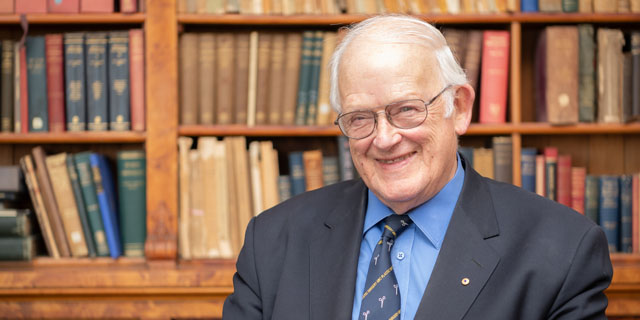
Then there was this article on Ian Taylor, who was in my year of Medicine at the University of Melbourne. When we enrolled in Medicine, it was the only medical course available in Victoria. Moreover, the University of Melbourne was then the only university in Victoria.
From my year 12 at school, including Taylor and myself, about 20 went into Medicine, which was about ten per cent of the first year. There were many very smart fellows and women, although our year had about 25 per cent women. It was 1958 after all.
In my opinion, and I have voiced it privately, Ian Taylor has made the greatest positive contribution of any student in my year of Medicine. I would go further and say that he was among the greatest Australians of his generation. A nomination for a Nobel Prize has been mooted.
Why? The article puts it clearly and simply. His work on being able to transplant whole segments of the skin, subcutaneous tissue, muscle and bone where there was a common blood supply was revolutionary. It enabled the operations where a flap was needed when there had been loss of tissue because of cancer surgery or extensive trauma to have a shortened time of recovery. Nevertheless, I feel that anything further I write about his many skills would be an inadequate acknowledgement of this great man.
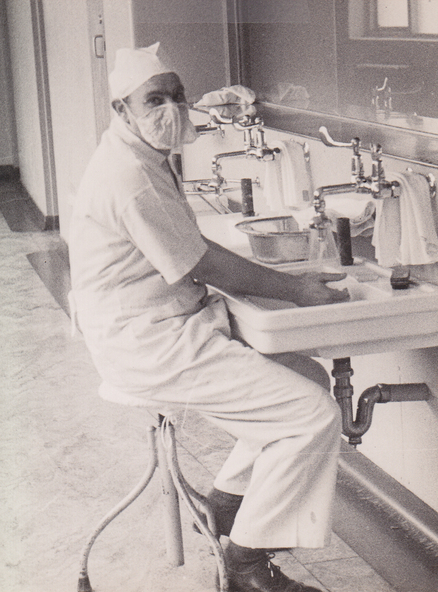
But then Melbourne was the place to be if you wanted to become a plastic surgeon. This was because of the presence of “Benny” Rank. Sir Benjamin Rank, as he was to become, was the doyen of plastic surgeons, having earned his reputation during WWII. His appointment to the Royal Melbourne Hospital (later at a specially designed unit at the Preston & Northcote Community Hospital {PANCH}) enabled him to establish a facility whereby a succession of highly skilled plastic surgeons, such as Taylor, was trained. They were also a group of innovative surgeons.
Rank did not suffer fools, co-wrote a definitive text on hand surgery and emerged from WWII as the father of plastic and reconstructive surgery in Australia, in particular Melbourne. It was Rank who inspired Taylor. We were in many ways a very lucky generation of doctors, who were taught by men and women (although women doctors were thin on the ground). There were some very impressive nurses whom we came in contact with who all saw war service. One of the distinguishing features about this group was their teaching prowess, with us gaining the benefit of their experience. Yet I can’t remember any of them talking about the War, even though many of them had been prisoners of war of the Japanese in Changi.
From my point of view, I have benefited from the skill of these trained surgeons. I sustained a car accident in 1981 where my chin sustained an implosion injury, and this injury required multiple operations. I ‘ve also had multiple skin cancers removed, including on face and ears. My current plastic surgeon was trained by Ian Taylor. He is highly skilled and before commencing practice, Nick Houseman obtained a Doctor of Medicine at the University of Melbourne – then a higher degree – gained by defining a particular vascular supply to a part of the body, being the first to do it. He was supervised by Taylor in this research endeavour.
The problem is that the reputation of plastic surgery has been compromised by a bunch of doctors who essentially dabble in cosmetic procedures without the training. Belatedly, as usual, AHPRA have now recognised that cosmetic surgery has been full of not only untrained incompetent medical practitioners, who have done a course set out on the back of a cereal packet, but also the fraudulent. All this dross should have been wiped off the medical map long ago.
Under the then current law, anyone with a basic medical degree or a GP or dermatologist could call themselves a cosmetic surgeon, even though not registered specialist surgeons, who receive eight to 12 years of postgraduate surgical training, unlike this mob with “cereal packet diplomas”.
For exposing this malfeasance, Mark Ashton, a prominent plastic surgeon was raided by unspecified “health department officials” following a spurious anonymous smear.
The problem with AHPRA is that it is about as tough as a bowl of cucumber soup. It tries to be palatable for everybody; but we shall see its ability in tackling the resulting recommendations from the Review.
This country is privileged to have high standards of plastic and reconstructive surgery, as epitomised by Ian Taylor. The article written in the school magazine should be amplified and used to reinforce the need for the imposition of strict standards and to expose the backdoor influencers who would want to water down any of the conditions imposed by the reputable plastic and reconstructive surgeons.
Yuletide
We have spent many Christmases outside Australia. I have mentioned some of them, where the Christmases were more traditional.
The most different Christmas away from the holly and the ivy and decorated Christmas tree was when we were staying in Little Governor’s camp in the Masai Mara.
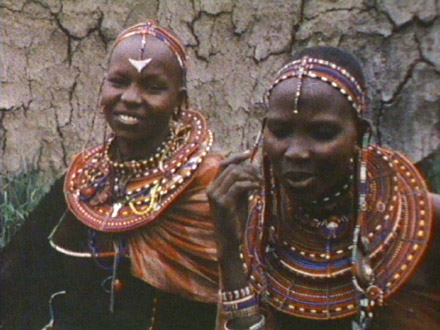 The highlight of Christmas morning was a visit to a Maasai village, and because there had been substantial rain, the ground was a swill of mud and animal excrement. The tall slender Maasai women performed their traditional dancing but with the women ululating.
The highlight of Christmas morning was a visit to a Maasai village, and because there had been substantial rain, the ground was a swill of mud and animal excrement. The tall slender Maasai women performed their traditional dancing but with the women ululating.
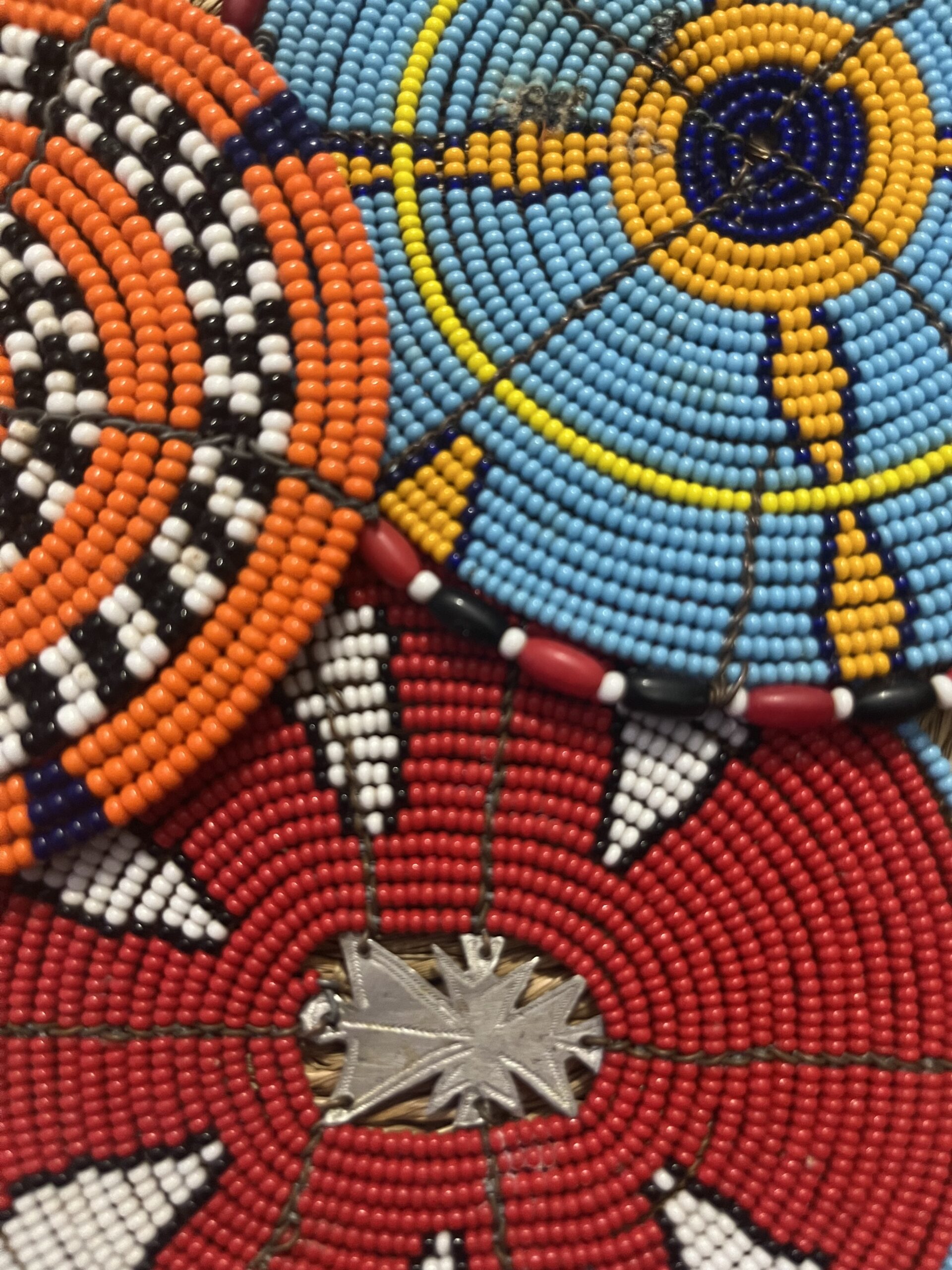 Christmas cheer as they offered us their bead jewellery, at a price.
Christmas cheer as they offered us their bead jewellery, at a price.
And then it was over. Maybe when I hear the processional hymn “Once in Royal David’s City”, who knows whether this applied to the Maasai village as much as anywhere else more conventionally Biblical, given how happy and joyous was the atmosphere engendered by these remarkable dancing women.
Hideaway
I have been to Argentina several times, but every time it has been when the country has been relatively stable, and not under the rule of the military.
In the late 80s, the Argentinian national airline started offering trips between Australia via New Zealand to Buenos Aires. I was lucky to be offered a trip there on one of the early flights, in exchange for a few articles that I would write for the medical press.
In those days, you could not reliably fly between Sydney and Buenos Aires without stopping. Returning to make the ocean crossing, one first had to fly south to Ushuaia, located between the Beagle Channel, glaciers and eternally snow-capped peaks on Tierra del Fuego, to take account of the prevailing Westerly winds.
In those days the Chilean airline flew as far as French Polynesia in clapped out Boeing 707s. Anyway, it was the time of Pinochet and I would have nothing to do with anything Chilean while he was in power. Today Lan Chile flies to Australia, the planes are relatively new, and there is the added attraction of being able to visit Easter Island. I have visited Chile on several occasions since Pinochet’s demise, but not Easter Island.
To me, Patagonia is as synonymous with Argentina as the tango and Evita Peron. It is one of the places where Charles Darwin explored, temporarily leaving the “Beagle”, where he received some of those intense insights which led him to the Origin of the Species. Disappointingly, tango was a tawdry tourist show in San Telmo, near the centre of Buenos Aires, and Peron was the tomb of Evita in the extraordinary cemetery at Recoleta, where I felt that de Chirico may be round the corner of the next street of mausoleums, painting. To gawk at the dance or at the Peron bier was tourist grist, but the drive from the airport at Bariloche was not quite what the tourist expected.
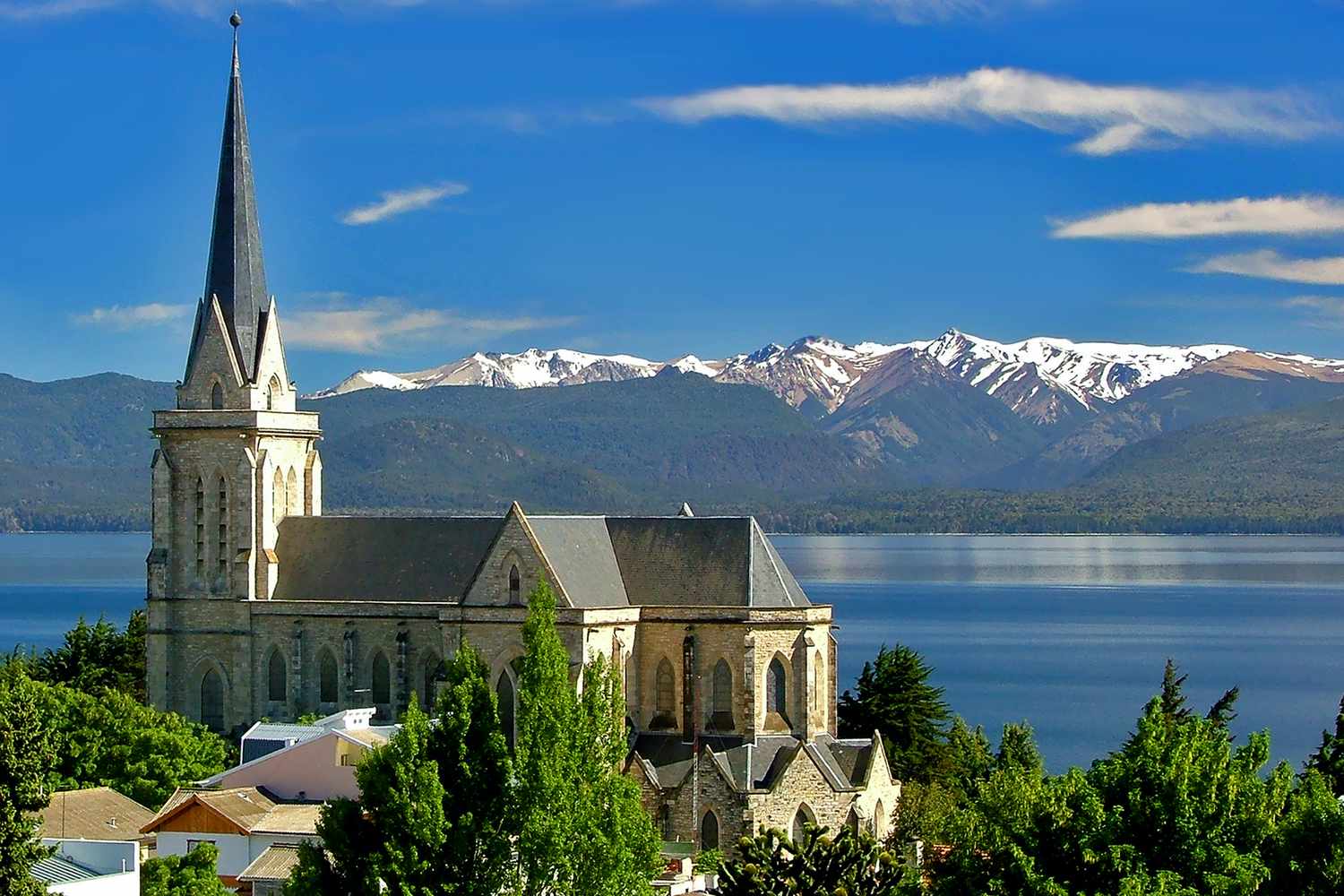
Bariloche is approached from the windswept Patagonian plain. You come in through the shacks of the Chilean Indian refugees. Perhaps “refugees” is too harsh a word since Bariloche lies near the Chilean border and there were few jobs at home in Chile for these Indians. It is somewhat ironic that the only Indians in Argentina are of Chilean stock.
It confirms what our companion murmurs when we see a black man singing on the Florida, one of the main streets in Buenos Aires. He is probably Uruguayan. Argentinian history’s heritage is exclusively on the European white side.
There is a mass of undistinguished light industrial factories, and then suddenly the lake can be seen and there is Bariloche – a German mountain village, complete with excellent chocolate, fine porcelain, and a hotel called Edelweiss, our room with a balcony lined with flowerboxes and overlooking the lake – Nahuel Huapi.
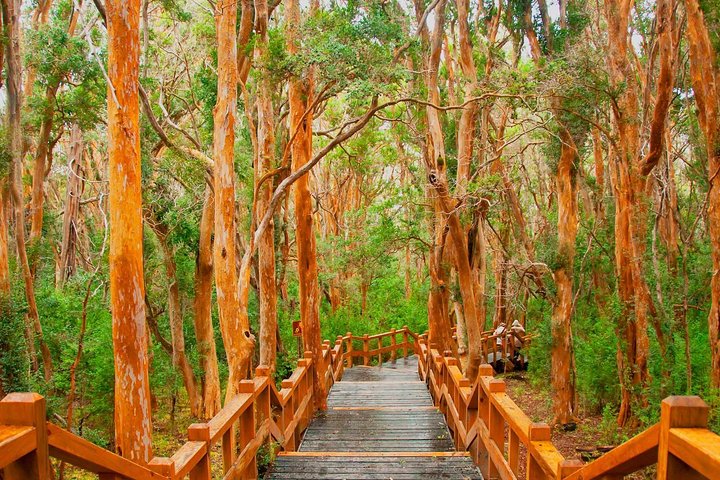
Across the lake was an island where one finds the arrayan trees -the so-called bambi trees because of their cinnamon-coloured trunks, dappled like the Disney fawn, Bambi. Hence these trees create groves of magical trees, which brings out for a moment that sense of wonderment I once had as a child.
Even though we arrive in mid-summer, the nights are cool enough to enjoy both raclette and fondue – and it is evident that there is also a strong German Swiss influence in this resort.
Some of the brochures say the town reminds one of Bavaria – there, predominantly German settlers had settled from the last part of the 19th century onwards. And that word “onwards” had dark connotations.
It is reputed to be one of the places where prominent Nazis fled to avoid the retribution. It is alleged that the mastermind for this movement was a Vatican bishop, an Austrian named Alois Hudal. He was reputed to have gained from President Peron around 5,000 Argentinian visas, which he used in his ratlines to enable these war criminals to flee to Argentina, where they fashioned themselves as in the main German settlers. It was here that the Israelis apprehended Adolph Eichmann, took him back to Israel for trial and subsequent execution.
Bariloche is where we took our first look at the Andes. We hire a car and driver to make the trip to Mount Tronador, where one of its peaks is in Chile and one in Argentina. We can see the peak this day, free from the clouds which often cloak it. We fumble around on the moraine at the end of the glacier and climb the rocks beside a mountain stream which cascades from the side of the mountain, but we do not make any serious endeavour to climb onto the glacier or attempt to follow the stream to its source. Yet the trip has taken away that uncomfortable feeling of a village, which we might have been sharing with war criminals.
We would never know because we left Bariloche soon after.
Mouse Whisper
According to the Energy Information Association (EIA), Venezuela, with 304 billion barrels of oil reserves, is in first place, followed by Saudi Arabia (259 billion), Iran (209 billion), Canada (170 billion) and Iraq (145 billion). By comparison, the United States has proven crude oil reserves of 44 billion barrels, that puts the country in 10th place.
And Venezuela wants to invade Guyana next door to get more oil reserves. We need another war around the globe like we need a cerebral gulch.
Yet Guyana only has reserves of eleven billion barrels.
Maduro, the proliferately spending Venezuelan President apparently has not heard of the Micawber Principle. “Annual income twenty pounds, annual expenditure nineteen pounds nineteen and six, result happiness. Annual income twenty pounds, annual expenditure twenty pounds ought and six, result misery.”

